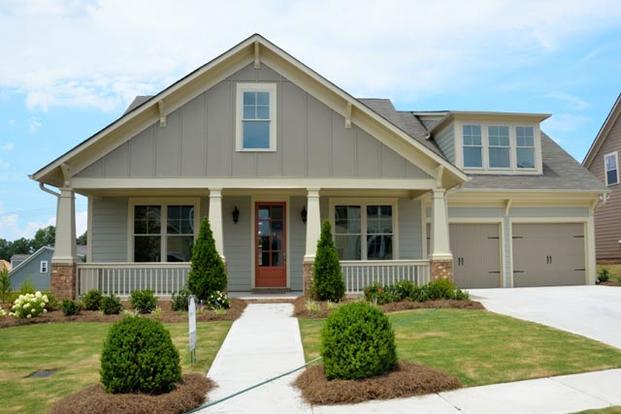You may have heard of people taking out a second mortgage on their house to get cash to help pay bills, send a kid to college, or make home improvements. The VA's cash-out refinance option is similar to a second mortgage but, for some, can be a much better deal.
What Is a VA Cash-Out Refinance?
A VA mortgage, like any other mortgage, can be refinanced through either a standard or "streamline" refinance.
A VA streamline refinance, also known as an Interest Rate Reduction Refinance Loan (IRRRL), simplifies the process by requiring no appraisal, income documentation, employment verification, or credit check — hence the term "streamline."
But what if the borrower wants to pull out additional cash from the refinance? By choosing a cash-out refinance, the streamline option goes away, but this option comes with benefits.
Benefits of a Cash-Out Refinance
A VA-backed cash-out refinance loan can help borrowers to take cash out of their home equity to:
- Pay off high-interest debt, such as a credit card balance
- Pay off liens
- Pay for school
- Make home improvements
The cash-out loan can pay off VA, FHA, or conventional mortgages, whether current or delinquent. The loan must be secured by a first lien on the property. Any remaining proceeds can be taken as cash for lender-approved purposes.
A cash-out refinance can allow a borrower to refinance a non-VA loan into a VA-backed loan. Unlike a second mortgage, which creates a separate lien on your property, a VA cash-out refinance consolidates everything into one loan. This approach often results in lower interest rates (typically 2–3% less) and simplifies monthly payments and tax preparation.
VA Cash-Out Refinance Loan Amount
The amount you can borrow depends on the equity in your home. Equity is the difference between your home's value and the remaining mortgage balance. For instance, if your home is valued at $250,000 and you owe $150,000, you have $100,000 in equity. VA cash-out refinancing allows borrowing up to 100% of your home’s value, meaning you could receive up to $100,000 in cash. This could be based on a new appraisal.
To give an example, let's say a borrower applies for a VA home loan and the appraised property value is $300,000. The maximum loan amount according to the VA's rules will be the same as the value, $300,000. So if the existing VA mortgage balance is $200,000 and closing costs are $5,000, the cash to the borrower would be $300,000 minus $205,000, or $95,000.
However, even though the VA allows for a cash-out refinance, it doesn't mean VA lenders will do so. Most VA lenders cap the maximum loan amount at 90% of the value of the home.
Another thing to keep in mind is that while the VA doesn't have a maximum loan amount, it does have a maximum amount it will guarantee. This guaranty is 25% of the VA home loan should it go into default.
VA Cash-Out Refinance Income Requirements
The VA cash-out loan requires the borrower to provide evidence of income or employment documentation, or both. This usually means providing pay stubs for the most recent 30-day period. Income must be verified for everyone on the loan application.
The borrower will also be asked to provide W-2 forms from the previous two years. Many VA lenders also ask for copies of the most recent two years of federal income tax returns. The lender is required to determine that the borrower's income is sufficient to cover the new cash-out mortgage payments in addition to other monthly obligations, such as automobile, credit card or student loan payments.
Credit Score Requirements for a Cash-Out Refinance
In a cash-out loan, your credit report will be pulled and reviewed by the VA lender. While the VA does not establish a minimum credit score, most lenders require a minimum credit score of 620. However, lenders have the right to require a score of 680 or above.
VA Lender Property Appraisal
VA cash-out loans typically require a full appraisal, since the maximum loan amount is based on the home's current appraised value. But the borrower can opt for less than the full amount. Just because a VA cash-out loan can be as much as 100% of the value of the property does not mean the veteran is required to accept the maximum.
To proceed, you'll need a VA Loan Certificate of Eligibility. The process also involves signing disclosures and attending the closing to receive your cash.
Is a Cash-Out Refinance a Good Idea?
Make sure the VA cash-out program is a true benefit to you. Remember that VA home loans usually require a funding fee that can be as much as 3.15% of the loan amount, reducing the net amount of cash to the borrower.
If you have enough equity in your home, a cash-out loan underwritten to conventional standards can provide more cash to you without the need for a funding fee.
Pros and Cons of a VA Cash-Out Refinance
Pros:
- You can turn your home's equity into cash.
- You may be able to drop your mortgage rate at the same time.
- You may be able to gain the ability to pay off a non-VA loan if needed.
- You may be able to eliminate private mortgage insurance (PMI).
Cons:
- Cash-out refinancing increases your mortgage balance. Extending the repayment period might result in paying more interest over the life of the loan.
- There are limits on the amount of liability the VA can assume.
- You'll likely need to pay a funding fee on top of closing costs.
- Paperwork. You are required to provide documentation such as paycheck stubs, W-2 forms, federal income tax returns and any other information your lender requires.
Take the Next Step
If you're ready to move forward or just want more information, the first step is to get no-obligation rate quotes.










